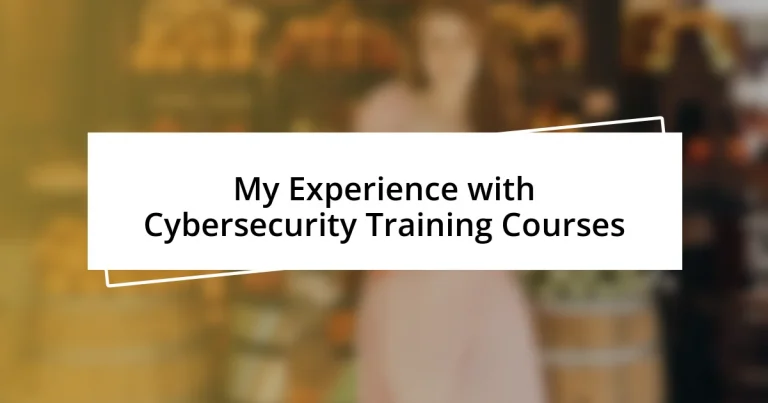Key takeaways:
- The author experienced significant growth in critical thinking and problem-solving skills through hands-on labs and real-world simulations during cybersecurity training.
- Cybersecurity education fosters a protective mindset, empowering individuals to identify threats, make informed decisions, and enhance their personal and community security awareness.
- The future of cybersecurity training will increasingly leverage technology, such as virtual reality and AI, to create personalized, engaging learning experiences that emphasize both technical and soft skills.
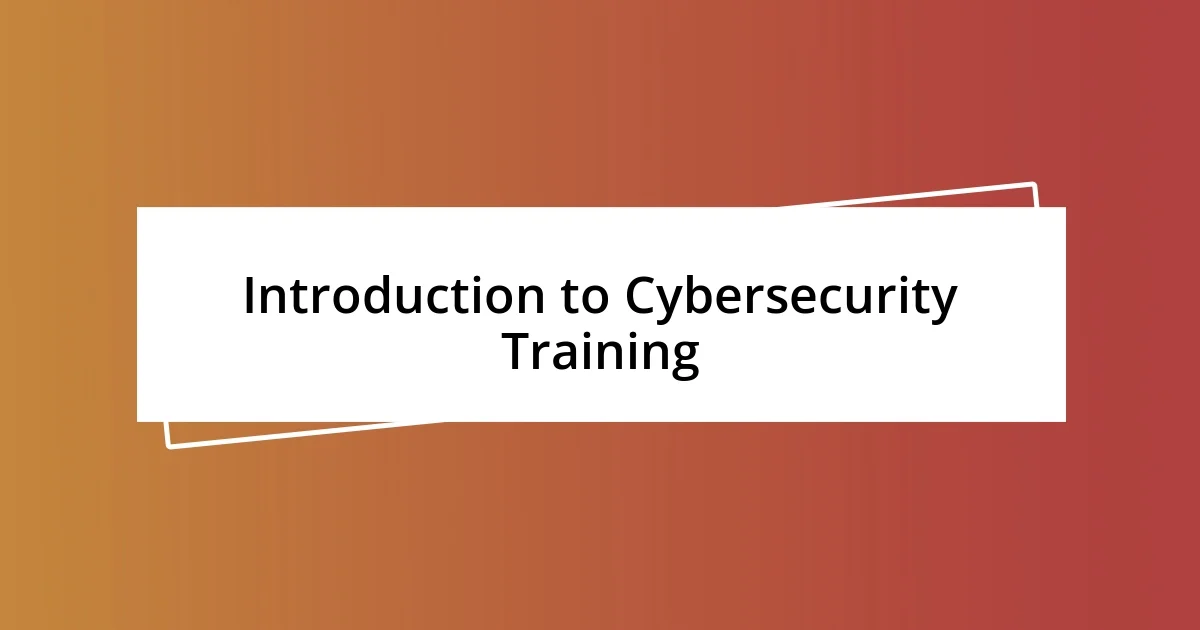
Introduction to Cybersecurity Training
Diving into the world of cybersecurity training can feel a bit overwhelming at first. I remember my initial experience; I felt like I was entering a high-security vault where every detail mattered. Have you ever wondered what goes into keeping our digital lives safe? Training equips individuals with the knowledge to protect sensitive data and understand potential threats, which is crucial in today’s tech-driven landscape.
As I progressed through my training, each module felt like peeling back the layers of a complex onion. Concepts like threat detection and risk management began to resonate with me on a deeper level. I still recall how fascinating it was to learn about social engineering attacks, which made me more conscious of the seemingly innocent interactions in everyday life. Isn’t it incredible how sharp skills can transform our understanding of digital safety?
What I found most rewarding about cybersecurity courses was their practical approach. Engaging hands-on labs and real-world scenarios simulated actual cyber threats, creating an adrenaline rush as I solved problems in real time. It sparked a newfound confidence in my ability to navigate the digital realm. Thinking back, those experiences shaped not just my professional journey but also my personal commitment to cybersecurity awareness.
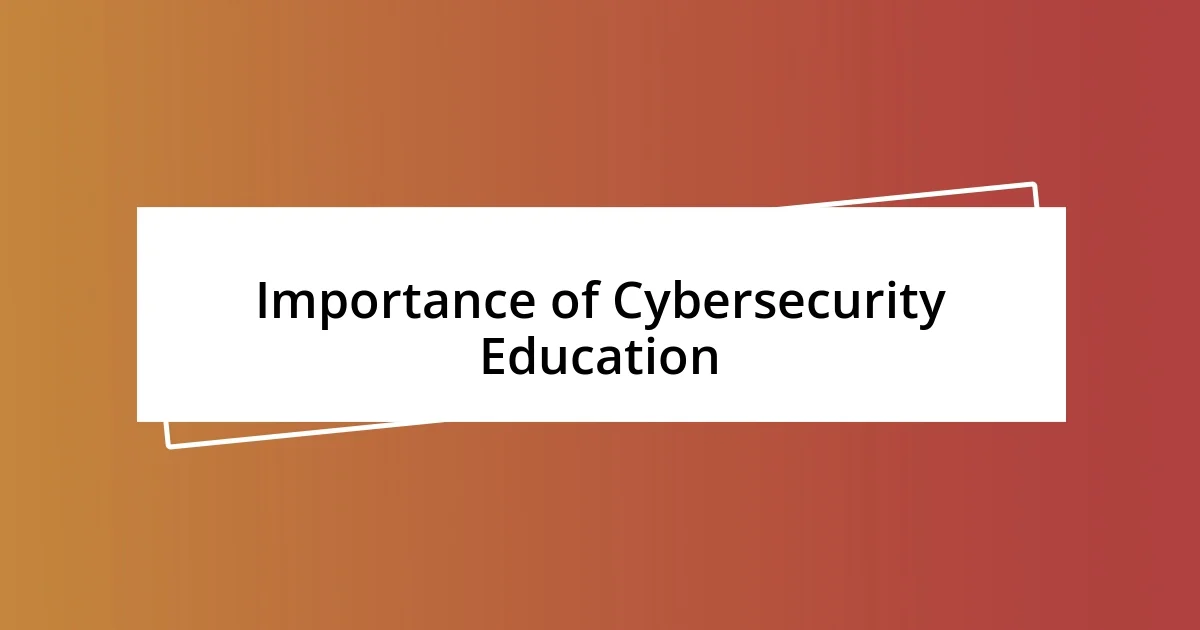
Importance of Cybersecurity Education
Understanding the significance of cybersecurity education has become a personal revelation for me over time. I remember the days when I thought cybersecurity was just about setting up a strong password. As I delved deeper, I realized it’s much more than that; it’s about creating a protective mindset. When equipped with the right knowledge, individuals can not only defend against attacks but also foster a culture of security awareness within their communities.
The following aspects make cybersecurity education essential:
- Increased Awareness: Courses help identify the latest threats, making people more vigilant.
- Empowered Decision-Making: Educated individuals can better assess risks and choose effective security measures.
- Enhanced Confidence: Training boosts self-assurance when confronting potential cyber threats.
- Adaptability: Knowledgeable individuals can swiftly adjust to evolving technology and related vulnerabilities.
Every time I learn something new in cybersecurity, I feel like I’m adding another layer to my personal armor, ready to face the digital world’s challenges.
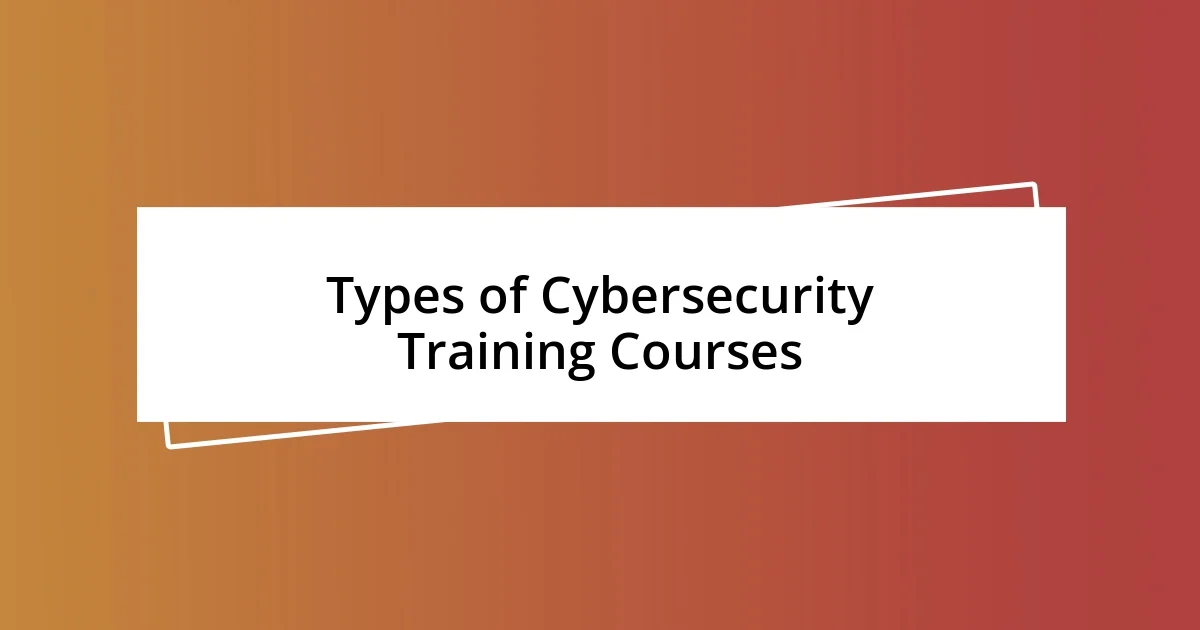
Types of Cybersecurity Training Courses
Although there are many types of cybersecurity training courses, I’ve found that some resonate more than others based on personal experience and learning styles. Technical courses, for instance, focus on hands-on skills like ethical hacking, secure coding, and network defense. Those were particularly engaging for me, as I had the chance to practice real-life scenarios. I remember troubleshooting a simulated attack, and that thrill of finding the vulnerability felt absolutely empowering.
On the other hand, non-technical courses often center around policy creation and risk management. These may not seem as thrilling, but they are incredibly important. I once took a course that emphasized the importance of compliance standards like GDPR and HIPAA. It struck me how policies shape the framework of security, guiding both individuals and organizations in implementing protective measures. Have you considered how policies impact your everyday online interactions?
To give a clearer picture, here’s a comparison of the two types of courses to help you understand their different focuses:
| Course Type | Description |
|---|---|
| Technical Courses | Hands-on skills in areas like ethical hacking and network defense. Focuses on real-world application. |
| Non-Technical Courses | Emphasizes policy and risk management. Focuses on creating a security culture and compliance. |

My Training Course Selection Process
When I began selecting cybersecurity training courses, I started by assessing my current skill set and future goals. I realized that I needed a blend of technical and policy-focused courses to get a well-rounded view of cybersecurity. It was a bit like standing in front of a buffet with so many delicious options; I had to pick wisely based on what would nourish my knowledge the best.
During this selection process, personal recommendations played a crucial role. I reached out to colleagues and friends who had taken various courses. It’s interesting how a simple conversation can steer your choices in a significant way. For instance, one friend passionately spoke about a course that offered real-world simulations. That sparked my interest, leading me to enroll, and I still remember the adrenaline rush during those practical sessions—it was transformative!
Another key factor for me was the credibility of the training providers. I found myself Googling reviews and checking accreditation before committing. Have you ever felt that twinge of doubt before making such choices? I did. Ultimately, I aimed for courses that provided not just knowledge but also a reputable certification—something that would add value to my professional journey. Each step in the selection process fueled my excitement and curiosity about diving deeper into the world of cybersecurity.

Key Skills Gained from Training
One of the most valuable skills I gained from cybersecurity training was critical thinking. I vividly recall a challenge during a course where we had to identify security weaknesses in a mock organization. It required me to analyze situations from multiple perspectives. This skill has not only enhanced my problem-solving abilities but has also extended into my daily life. Have you ever noticed how critical thinking helps in making better decisions?
Another key takeaway was the ability to develop and implement security policies effectively. I remember drafting a mock incident response plan and feeling a sense of accomplishment upon its completion. The process taught me how to foresee potential risks and address them proactively. This is especially crucial, as I’ve learned that anticipating threats can make a significant difference in real-world applications. Do you realize how often planning makes the difference between success and failure?
Communication skills were another unexpected benefit. Throughout the courses, I often participated in group discussions and presentations. I learned how to articulate complex cybersecurity concepts in simple terms, both to my peers and non-technical stakeholders. This experience was eye-opening. It reminded me how crucial it is to ensure that everyone, regardless of their background, understands security measures. How do you convey technical information in your field?

Real-Life Applications of Training
Participating in simulation exercises during my cybersecurity training made the concepts come alive in unexpected ways. I remember one session where we had to respond to a simulated data breach in real-time. The pressure was immense, and my heart raced as I worked with my team to analyze the situation. That experience wasn’t just theoretical; it gave me the confidence to handle real-world challenges when they arose in my job. Have you ever felt that adrenaline kick in during a high-stakes situation? It’s a feeling that reinforces just how vital that training is.
I also found that my training greatly enhanced my ability to conduct risk assessments. During one course, we were tasked with evaluating the security setup of a fictional company and identifying vulnerabilities. When I applied this knowledge in the workplace, it felt empowering to leverage those insights to improve our systems. It was like putting together a puzzle—suddenly, I could see the gaps that I hadn’t noticed before. Don’t you think it’s fascinating how training can change your perspective?
Finally, I discovered the importance of teamwork through collaborative projects. In one memorable group assignment, we created a cybersecurity awareness campaign for employees. It was a joy to brainstorm ideas and share responsibilities; it taught me how diverse perspectives can lead to better outcomes. I left that training session with new friendships and a deeper understanding of how essential collaboration is in safeguarding against cyber threats. Have you experienced the magic of teamwork in a critical context? It truly shows the strength we can harness when we join forces.
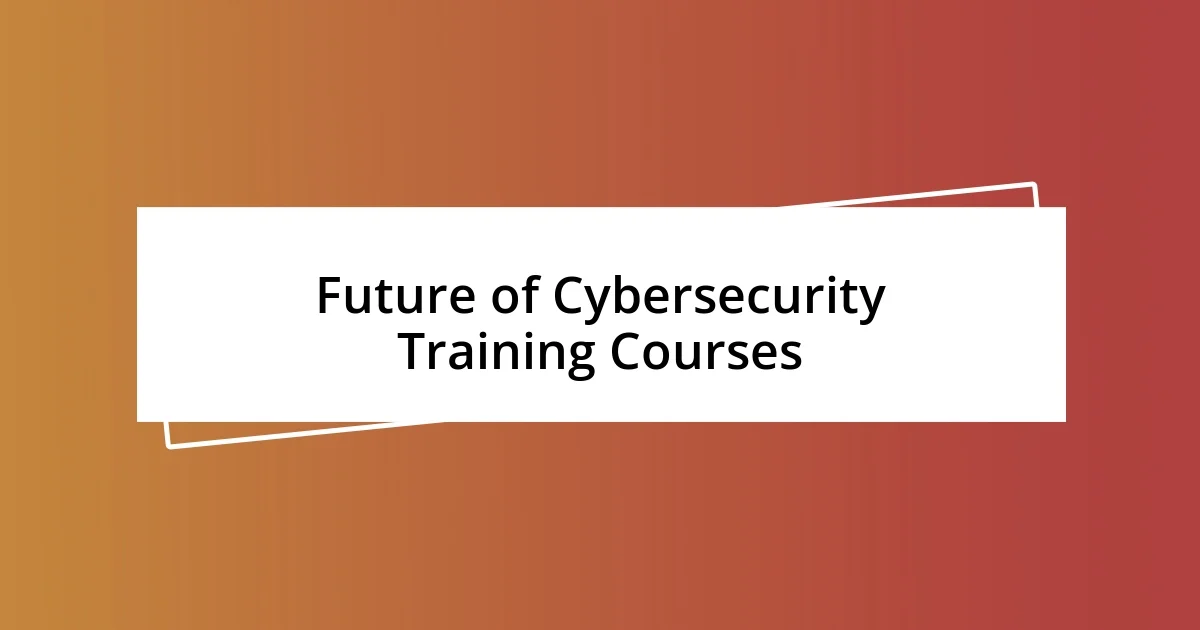
Future of Cybersecurity Training Courses
The future of cybersecurity training courses is looking increasingly promising, especially with advancements in technology. I remember attending a session on virtual reality simulation as a training tool, which was nothing short of an eye-opener. Imagine donning a headset and immersing yourself in a scenario where you must fend off a cyber attack; it transforms learning from static lectures to a dynamic experience. Have you ever considered how engaging learning environments could reshape skill retention?
Moreover, with the rise of artificial intelligence, training programs are evolving to include personalized learning experiences. In one course, we were introduced to AI-driven platforms that adapt to individual learning paces and styles. It dawned on me how such tailored approaches can make cybersecurity training not only more engaging but also significantly more effective. How often do you think about the learning methods that resonate with you the most?
Finally, I foresee an increased emphasis on soft skills in these training courses. Reflecting on my experiences, I noticed how crucial it is to understand the human element of cybersecurity. In an era where cyber threats often exploit human weaknesses, courses that focus on emotional intelligence and communication will be invaluable. Do you think that the ability to foster teamwork and resilience can be just as critical as technical knowledge in combating cyber threats?












